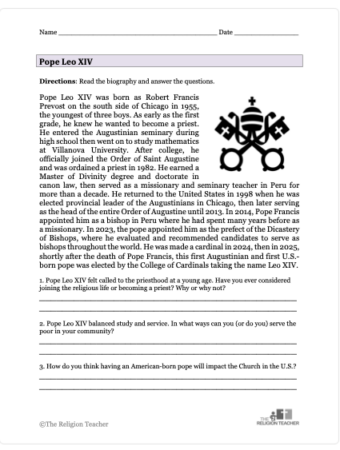Hope in “Offering Up”
Many adults today can remember the common practice of “offering up” the irritations of our day to day lives. In his second encyclical, Spe Salvi, Pope Benedict suggests that this practice, which seems to be less common today, may be worth reviving in our daily living. The purpose of offering up is to give the little annoyances of our daily lives meaning by taking up our cross and joining in “Christ’s great ‘com-passion’” (n. 40). To a world that rejects suffering and avoids it at all costs, Benedict expresses that suffering is an opportunity for God’s people to grow in love for one another. Love is naturally selfless; but suffering causes us to ignore hope and focus on ourselves rather than others. However, if one is to suffer for others like Christ did in his passion and death, then the meaning of suffering is transformed from selfishness to love and hope.
Kids complain. Every day there seems to be a plenty of little annoyances that get blown out of proportion. These little annoyances cause them to focus on themselves and they ignore the possibility of finding hope in their minor suffering. In order to curb such selfishness, read excerpts from Christ’s passion from one of the Gospels. Make some of the following points: Christ did not complain about his suffering, he did not avoid it, he endured it for us, and if we are to be like Christ then we too must endure suffering like him. In the context of Christ’s passion, introduce to your students (and for many this will be a real introduction) the practice of offering up the little annoyances of their daily lives rather than complaining about them. Start this practice by asking them to think of something that is irritating them lately and suggest that they endure that suffering with Christ for others. At other times, you can respond to complaints from your students by suggesting that they offer it up. However, be sure that you do not make this suggestion lightly and do not use it as a justification for giving an extra amount of homework or a difficult assignment.
Inevitably the question will arise: who is benefiting from this offering up and how is that possible? The Holy Father teaches that hope can also be learned through judgment, especially in purgatory. The Church teaches that those being purified in purgatory, on their way to their heavenly home, can be assisted by the prayers and actions of the faithful on earth because we are all united in a communion of saints. All of God’s people are united on one Body, the Church, and salvation is received through that Body not as individuals but as a community. Pope Benedict says, “It is never too late to touch the heart of another” (n. 48). Offering up the minor suffering of one’s day is not for an imaginary group of people, it is touching the heart of the souls in purgatory.
Read the Rest of this Series:
Part I: Learning Hope Through Prayer


